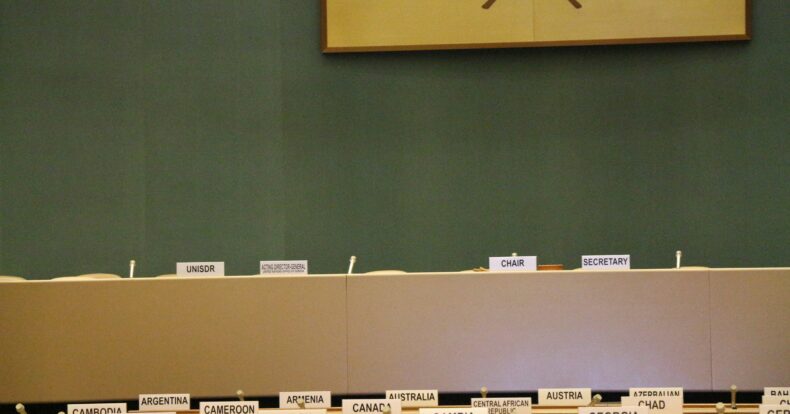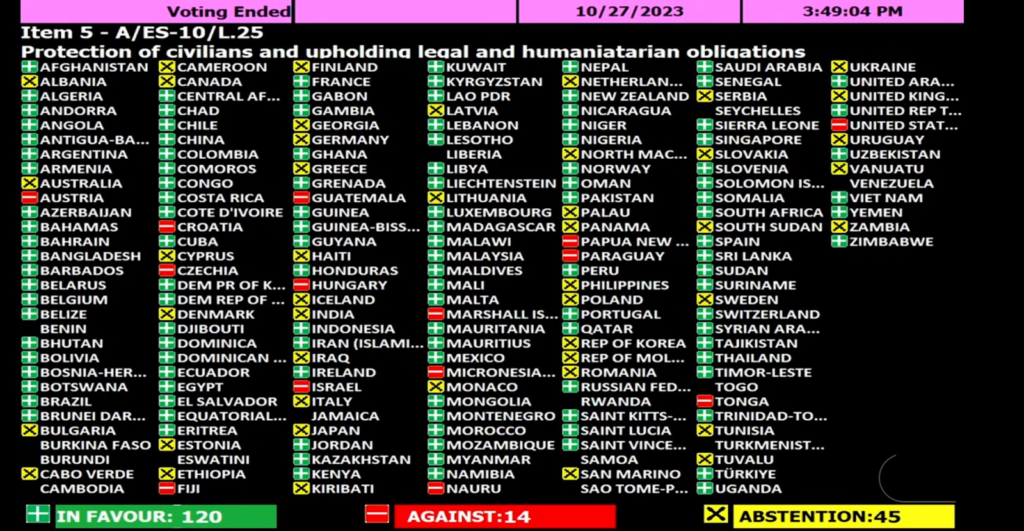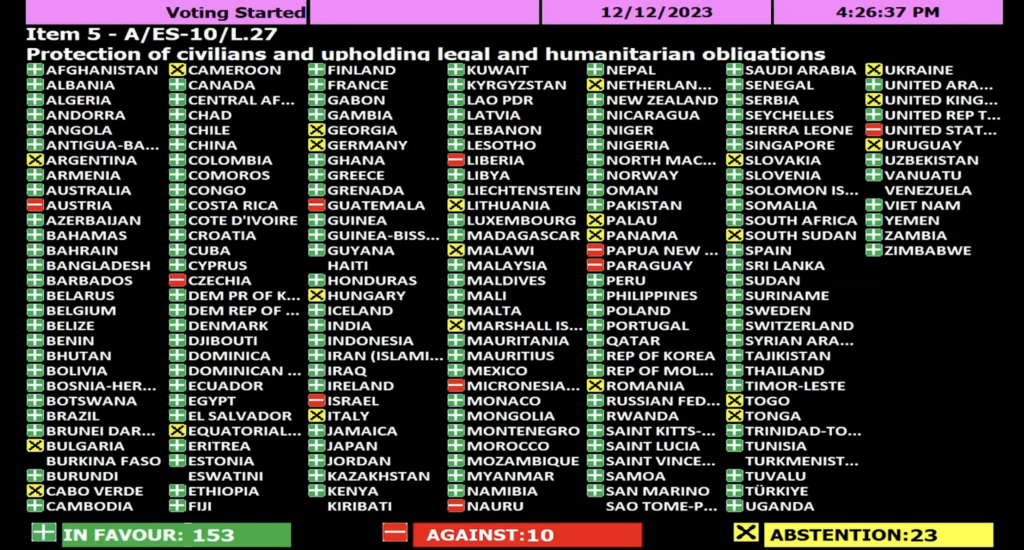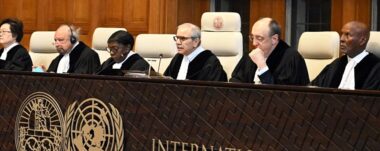Gaza Israel: Overwhelming Majority At The United Nations (UN) General Assembly

We share the text written by Professor Nicolás Boeglin, from the Law School of the University of Costa Rica. Original title: “Gaza / Israel: about the overwhelming majority observed in the United Nations General Assembly”.
More than 5,300 Palestinian children have been reportedly killed in just 46 days – that is over 115 a day, every day, for weeks and weeks. Based on these figures, children account for forty per cent of the deaths in Gaza. This is unprecedented. In other words, today, the Gaza Strip is the most dangerous place in the world to be a child.
UNICEF Executive Director, briefing at UN Security Council, November 22, 2023
“We are also receiving reports that more than 1,200 children remain under the rubble of bombed out buildings or are otherwise unaccounted for.
Gaza Israel
Following a request received by Egypt and Mauritania (see joint letter), the President of the United Nations General Assembly convened a new emergency session of this plenary body, which was held on December 12 to examine the dramatic situation in Gaza. This emergency session culminated in a vote on a resolution, the first draft of which was already circulating on some social networks (see link).
The last United Nations report prior to the vote (as of December 11) indicated that:
According to the MoH in Gaza, between 7 October and 11 December afternoon, at least 18,205 Palestinians were killed in Gaza, about 70 per-cent of whom are said to be women and children, and about 49,645 were reportedly injured.Many more people are missing, presumably under the rubble, waiting for rescue or recovery […] Overall, 104 Israeli soldiers have been killed in Gaza since the start of the Israeli ground operations, and another 582 have been injured, according to the Israeli military.
In order to have an idea of the devastating effect of Israel’s bombardment of Gaza, this same report recorded the following in relation to the most recent observed bombings:
On 10 December, at about 15:40, a bicycle was reportedly hit, near Jalal Street, in the centre of Khan Yunis, killing 2 Palestinian children who were riding it. […] On 10 December, at about 18:10, 22 people were reportedly killed when a house was hit in Al Maghazi Refugee Camp. […] On 11 December, at about 02:15, ten people were reportedly killed when a residential apartment was hit, west of Rafah. […] On 11 December, at about 11:00, ten people were reportedly killed when a house was hit in Deir Al Balah.
It should be noted that this recent report by the NGO AirWars details a single air strike carried out on October 25 by Israel, which caused the death of more than 100 people in Gaza.
Gaza Israel
With regard to the situation in the southern part of Gaza, where humanitarian aid enters in a very limited way in view of the shortages of all kinds suffered by the displaced persons coming from the northern part, UN officials have described the situation as “apocalyptic” (see article in The Guardian of 5/12/2023).
It should be noted that a well-known French expert and ex-military specialist in the effects of aerial bombardments recently read in France that the death toll in Gaza could be much higher. Using the number of bombs that Israel officially acknowledges having dropped from the air on Gaza since October 7, he indicates in his latest reflections published on his blog (see his complete note of December 16, entitled “Israel against Hamas, a carnage and compris for the victims ?“) that:
Avec au moins 450 bombardements (aériens et tirs d’artillerie) par jour, cela représente au minimum un nombre de victimes équivalent puisque ces tirs sont par nature très meurtriers. Les dégâts sont considérables : 63 jours par 450 tués = 28,000 morts au minimum, soit une « fourchette » probable de 25 à 35 mille morts, auxquels il faut rajouter 3 à 4 fois plus de blessés, donc un total de plus de 125,000 morts et blessés après 9 semaines de bombardements (et une semaine de trêve).
On December 17, the World Health Organization (WHO) described the Al-Shifa hospital in Gaza as a “bloodbath” (see press release) due to the impossibility for doctors and nurses to properly treat the many seriously ill patients who continually arrive at this hospital. For its part, the NGO Human Rights Watch, in a subsequent communiqué (see full text), denounced Israel for resorting to the worst recourse to which a State can subject a civilian population in the context of an armed conflict: starvation.
Other calls from the United Nations in the face of the senselessness of the Israeli military response
From the office of the UN High Commissioner for Human Rights, the UN Special Rapporteur on the Occupied Palestinian Territories recently called on the international community (see interview in France24), and her UN colleagues endorsed her position (see joint statement issued on December 8 entitled “UN experts urge States to unite for peace and push for ceasefire in Gaza“).
On December 14, several United Nations human rights experts reiterated the urgency of a humanitarian ceasefire in the face of the senselessness of the Israeli military operation in Gaza: see their press release entitled “Occupied Palestinian territory and Israel: UN experts call for permanent ceasefire to protect rights and futures of women and girls“.
Joint Application In Brief
In their letter to the President of the General Assembly, Egypt and Mauritania indicated that:
In the absence of a ceasefire and in light of the ongoing grave breaches of international law, including humanitarian and human rights law, and violations of the relevant United Nations resolutions, including resolution ES-10/21, the situation in the Occupied Palestinian Territory, including East Jerusalem, particularly in the Gaza Strip, has continued to dramatically deteriorate.
It is noteworthy that both States also referred in their letter to resolution 377 (see texto ylink to official versions) adopted in 1950 by the General Assembly, which recognizes the powers of the General Assembly when the Security Council proves incapable of ensuring international peace and security. Indeed, General Assembly resolution 377 adopted in 1950 (Note 1) states that:
Resuelve que si el Consejo de Seguridad, por falta de unanimidad entre sus miembros permanentes, deja de cumplir con su responsabilidad primordial de mantener la paz y la seguridad internacionales en todo caso en que resulte haber una amenaza a la paz, un quebrantamiento de la paz o un acto de agresión, la Asamblea General examinara inmediatamente el asunto con miras a dirigir a los miembros recomendaciones apropiadas para la adopción de medidas colectivas, inclusive, en caso de quebrantamiento de la paz o acto de agresión, el uso de fuerzas armadas cuando fuere necesario, a fin de mantener o restaurar la paz y la seguridad internacionales.
A Quick Contextualization
This joint initiative by Egypt and Mauritania arose precisely from the fact that a solitary veto by the United States in the Security Council prevented the adoption of a resolution proposed by the United Arab Emirates, which had 13 votes in favor and one abstention (United Kingdom): see the official United Nations press release of December 8 and this press release.
In his statement, the delegate of the United Arab Emirates did not hesitate to state (see full text of his speech) that:
The United Arab Emirates is deeply disappointed with the outcome of today’s vote. Regrettably, and in the face of untold misery, this Council is unable to demand a humanitarian ceasefire. Let me be clear. Against the backdrop of the Secretary-General’s grave warnings, the appeals by humanitarian actors, the world’s public opinion – this Council grows isolated. It appears untethered from its own founding document. What is the message we are sending Palestinians if we cannot unite behind a call to halt the relentless bombardment of Gaza? Indeed, what is the message we are sending civilians across the world who may find themselves in similar situations?
This North-American veto has contributed to isolate the United States more and more and to consolidate the deep repudiation generated by its total support to Israel since the beginning of the disproportionate and indiscriminate military actions over Gaza by Israel, in response to the attack perpetrated by Hamas on the morning of October 7, 2023. This US veto also confirms the solitude of the United States within the Security Council itself, already observed on past occasions when dealing with Israel (Note 2).
Gaza Israel
We also had the opportunity to analyze the letter of the Secretary-General of the United Nations of December 6, 2023, using Article 99 of the Charter (see document S/2023/962): its reading is recommended, as it is a legal tool used by the Secretary-General only a dozen times since 1945. We refer our esteemed readers to our article entitled “Gaza / Israel: UN Secretary-General activates Article 99 of the UN Charter” published on the same December 6, 2023.
Israel’s reaction to this initiative of the Secretary General was not long in coming, describing the highest representative of the United Nations as a “threat to world peace” (see article from ElPais / Spain): yet another angry reaction, one of the many official Israeli gestures that no longer impress anyone in the United Nations (or even outside it), and recall a few previous ones of the same nature (Note 3).
Gaza Israel
It should be noted that a similar exercise in the General Assembly after a single veto by the United States in the Security Council took place in October, with Israel and the United States mustering only 12 votes against against 120 votes in favor: see our article of October 27 entitled “Gaza / Israel: a propósito de la abrumadora mayoría con la que la Asamblea General de Naciones Unidas adoptó una resolución pidiendo un alto a la violencia en Gaza y el respeto al derecho internacional humanitario“).
Gaza Israel
Regarding the proposed text that circulated a few days prior to December 12, and the position of the U.S. delegation with regard to the vote in the General Assembly, this December 12 press release from the United Nations reads as follows:
The US amendment reflects its continued point of contention regarding Hamas, which it designates as a terrorist group, calling for wording to be inserted “unequivocally” rejecting and condemning “the heinous terrorist attacks by Hamas that took place in Israel starting 7 October 2023 and the taking of hostages” as the first operative paragraph.
Predictably, the U.S. amendment submitted prior to the December 12 vote (see document A/ES-10/L.29) met the same fate as the Canadian amendment submitted in October 2023 in an attempt to modify the adopted resolution (see document A/ES-10/L.26): both were discarded for lack of sufficient votes in favor. An attempt by Austria (see document A/ES-10/L.28) for the December 12 vote was also unsuccessful. It is noteworthy that these proposed amendments were submitted not by several, but by only one State (out of the 193 States in the United Nations General Assembly), thus demonstrating the solitude of their authors.
Two diplomatic battles for Israel (and the United States): Oct. 27 and Dec. 12
This new diplomatic contest in the plenary body of the United Nations yielded even less favorable results for Israel and its staunch US ally: condemnation is already widespread of the heartbreaking images of wounded Palestinian civilians, many of them children and women, fleeing Israeli bombardments, as well as of the deliberate and intentional destruction of medical care centers and ambulances in Gaza by Israeli military forces.
It is worth noting that journalists in Gaza have become military targets for Israel, and that a report (also as of December 11) reported the death of 63 media professionals in Gaza and South Lebanon (see report). The conclusions reached by the NGO Airwars regarding the journalists killed in South Lebanon are compelling (see a href=”https://airwars.org/investigations/killed-press-vest-evidence-israeli-responsibility-for-attack-journalists-in-lebanon/”>report of December 7, 2023).
In this very recent interview with an Israeli journalist published in Spain, it is made clear that the Israeli media coverage in Israel does not report everything that happens in Gaza with the Palestinian victims.
Gaza Israel
A comparison between the board of October 27 and that of the vote of December 12 shows which states Israel still counts on: on the Latin American side, it was foreseeable that Guatemala would once again be the only one to vote against; while, in the American hemisphere, it was of great interest to observe whether Canada would maintain its unexpected abstention of last October… or would finally decide to vote in favor of a humanitarian cease-fire, moving away from what we called in a previous publication “the hard core coalition” on which Israel has always been able to count on, namely: the hard core of the coalition. or finally decided to vote in favor of a humanitarian cease-fire, moving away from what we called in a previous publication “the hard core coalition” on which Israel has always been able to count, namely: Australia, Canada, Marshall Islands, Micronesia, Nauru, Palau and the United States (Note 4).
The following is the table of the vote that took place on October 27, 2023:

Finally, although there were 45 abstentions in the October vote, many of the 45 “abstaining” States chose to vote in favor of the proposed text on December 12. It should also be noted that, in the October vote, 14 States opted for a “No Show” (absence of the delegate at the time the vote was recorded), but this time they chose to vote in favor.
Gaza Israel
A few minutes before 4:30 p.m. on December 12, the vote on the resolution presented (see text reproduced at the end of these brief reflections) yielded the following result: 153 in favor, 10 against and 23 abstentions, as detailed in the voting board reproduced below. In Latin America, the predictable Guatemala was joined by Paraguay among the 10 votes against; while Argentina chose this time to abstain, evidencing the drastic change of course in foreign policy.
As a rather remarkable detail, Australia, which, like Canada, constitutes the historical “hard core” of states that Israel has always been able to count on in its diplomatic contests at the United Nations, voted this time in favor of the text, as did Canada: an unmistakable sign that Israel is losing its closest allies by continuing to carry out collective punitive action against the civilian population of Gaza, in response to the attack perpetrated by Hamas last October 7.

In Conclusion
The vote having been taken on December 12, it was the following day that a major US news network revealed that, according to an internal US report, a large part of the bombings in Gaza have been carried out by Israel since October 7 with devices which do not have any modern precision mechanism, called “dumb bombs” (see CNN strong>article entitled “Nearly half of the Israel munitions dropped on Gaza are imprecise “dumb bombs” US intelligence assesment finds“, which is recommended reading). An interview with two former US military officers on this revelation (see text) allows to learn more about the practice of aerial bombardment and the unprecedentedness of the option used by Israel in Gaza since October 7.
This revelation disproves the official Israeli claim of alleged “smart bombs” used by Israel in Gaza, and confirms, from the perspective of international criminal law, Israel’s repeated commission of war crimes by using such devices in such a densely populated area as Gaza. This is not the first time that Israel’s strong arguments have proved fallacious: this article in The Guardian of November 17 and this subsequent report in The New York Magazine show that the alleged Hamas “operations center” under the Al-Shifa hospital in Gaza was never found.
Gaza Israel
With this overwhelming majority in favor of a humanitarian cease-fire on December 12, preceded by the letter of the UN Secretary General issued on December 6 to the same effect, and by the solitary veto of the United States observed on December 8 in the UN Security Council, the total isolation of Israel is confirmed. At the same time, these results place Israel’s main ally (the United States) in an indefensible position before international public opinion, as well as before American public opinion itself.
An organization such as Human Rights Watch did not hesitate to publicly ask the United States to reconsider its previous veto (see press release) on December 15. As of the same date, a new draft resolution submitted to the Security Council by the United Arab Emirates (see text circulating on networks) augurs a laborious end to the year for US diplomacy.
Text shared by Nicolás Boeglin, Professor of International Public Law, School of Law, University of Costa Rica (UCR). Contact: [email protected]
Notes
Nota 1: Sobre los alcances jurídicos de la resolución 377 y el Consejo de Seguridad, véase LEPRETTE J., “Le Conseil de Sécurité et la Résolution 377 A (1950)“, Vol. 34, AFDI (Annuaire Fran
Note 1: On the legal scope of resolution 377 and the Security Council, see LEPRETTE J., “Le Conseil de Sécurité et la Résolution 377 A (1950)“, Vol. 34, AFDI (Annuaire Français de Droit International) 1988, pp. 424-435. Full text of the article available here.
Gaza Israel
Note 2: The United States has voted alone in the Security Council when discussing the peculiar way in which the Israeli authorities act in open defiance of the norms of public international law:
– at its June 1, 2018 session, for a text proposed by Kuwait (see link to document S/2018/516) condemning Israel’s disproportionate use of force against unarmed Palestinian protesters during what was called “The Great March“, the vote obtained was 10 in favor, 1 against (United States) and 4 abstentions (Ethiopia, Netherlands, Poland and United Kingdom): see meeting minutes S/PV.8274.
– at its meeting of December 19, 2017, on the occasion of a text proposed by Egypt condemning the transfer of embassies to the city of Jerusalem (see link to document S/2017/1060), the recorded vote was 14 votes in favor and only one vote against (United States): see record S/PV.8139.
– the same result of 14 in favor and a single American veto was observed on February 18, 2011, on the occasion of a resolution condemning Israel’s illegal settlements in the West Bank and East Jerusalem (see link to document S/2011/24). The record S/PV.6484 of this meeting, in which the U.S. delegation registered such a striking mark, indicates the votes recorded (on page 4).
Gaza Israel
Note 3: It should be recalled that when the Office of the Prosecutor of the International Criminal Court (ICC) announced that it had proceeded to formally open an investigation in Palestine in December 2019, the Prime Minister and the Minister of Defense in Israel found no better argument than to disqualify the ICC by indicating that it is “anti-Semitic” (see the Jerusalem Post story and this Reuters nota del Jerusalem Post y este cable).
Note 4: See BOEGLIN N., “América Latina ante solicitud de opinión consultiva a justicia internacional sobre la situación en Palestina: breves apuntes sobre insólito voto en contra de Costa Rica“, La Revista.cr, edition of 1/02/2023. Text available here.
Document /material: text of the resolution adopted by the United Nations General Assembly this December 12, 2023 in English and Spanish version.
Protección de los civiles y cumplimiento de las obligaciones jurídicas y humanitarias
La Asamblea General,
Guiada por los propósitos y principios de la Carta de las Naciones Unidas,
Recordando sus resoluciones relativas a la cuestión de Palestina,
Recordando también todas las resoluciones pertinentes del Consejo de Seguridad,
Tomando nota de la carta de fecha 6 de diciembre de 2023 dirigida a la Presidencia del Consejo de Seguridad por el Secretario General 1 en virtud del Artículo 99 de la Carta de las Naciones Unidas,
Tomando nota también de la carta de fecha 7 de diciembre de 2023 dirigida a su Presidencia por el Comisionado General del Organismo de Obras Públicas y Socorro de las Naciones Unidas para los Refugiados de Palestina en el Cercano Oriente,
Expresando grave preocupación por la situación humanitaria catastrófica en la Franja de Gaza y por el sufrimiento de la población civil palestina, y poniendo de relieve que es preciso proteger a las poblaciones civiles palestina e israelí conforme al derecho internacional humanitario,
1. Exige un alto el fuego humanitario inmediato;
2. Reitera su exigencia de que todas las partes cumplan sus obligaciones en virtud del derecho internacional, incluido el derecho internacional humanitario, en particular respecto de la protección de los civiles;
3. Exige la liberación inmediata e incondicional de todos los rehenes y que se garantice el acceso humanitario;
4. Decide suspender temporalmente el décimo período extraordinario de sesiones de emergencia y autorizar a la Presidencia de la Asamblea General en su período de sesiones más reciente a que lo reanude cuando lo soliciten los Estados Miembros.
Protection of civilians and upholding legal and humanitarian obligations
The General Assembly,
Guided by the purposes and principles of the Charter of the United Nations,
Recalling its resolutions regarding the question of Palestine,
Recalling also all relevant Security Council resolutions,
Taking note of the letter dated 6 December 2023 from the Secretary-General, under Article 99 of the Charter of the United Nations, addressed to the President of the Security Council,
Taking note also of the letter dated 7 December 2023 from the Commissioner General of the United Nations Relief and Works Agency for Palestine Refugees in the Near East addressed to the President of the General Assembly,
Expressing grave concern over the catastrophic humanitarian situation in the Gaza Strip and the suffering of the Palestinian civilian population, and emphasizing that the Palestinian and Israeli civilian populations must be protected in accordance with international humanitarian law,
1. Demands an immediate humanitarian ceasefire;
2. Reiterates its demand that all parties comply with their obligations under international law, including international humanitarian law, notably with regard to the protection of civilians;
3. Demands the immediate and unconditional release of all hostages, as well as ensuring humanitarian access;
4. Decides to adjourn the tenth emergency special session temporarily and to authorize the President of the General Assembly at its most recent session to resume its meeting upon request from Member States.
Navigate articles



